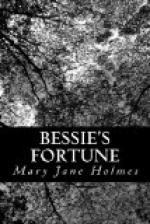Miss Betsey had expected to see him thin and worn, but she was not prepared for the white, wasted face, which turned so wistfully to her, or for the expression of the dark eyes so like her brother Hugh, Archie’s father. Hugh had been her favorite brother, the one nearest her age, with whom she had played and romped in the old garden at Stoneleigh. He had been with her at Monte Carlo when her lover was brought to her dead, and in the frightened face which had looked at her then there was the same look which she saw now in Neil, as he came slowly forward. She had expected a dandy, with enough of invalidism about him to make him interesting to himself at least; but she saw a broken, sorry young man, as far removed from dandyism as it was possible for Neil to be, and she felt herself melting at once.
He was her own flesh and blood, nearer to her even than Bessie; he was sick; he was subdued; he had crossed as a second-class passenger, and this went further toward reconciling her to him than anything he could have done.
“Why Neil, my boy,” she said, as she took both his hands, “I am sorry to see you so weak. Sit down; don’t try to stand; or rather, lie down, and I will sit beside you.”
She arranged his pillows and made him lie down again, he protesting the while, and saying, with a faint smile:
“It hardly seems right for a great hulking fellow like me to be lying here, but I am very tired and weak,” and in proof thereof the perspiration came out in great drops upon his forehead and hands, and about his pallid lips.
Miss Betsey did not talk long with him that night, but when she left him she promised to come again next day and bring him some wine, which she had made herself, and which was sure to do him good.
“Sleep well to-night, and you will be better to-morrow,” she said.
But Neil did not sleep well, and he was not better on the morrow, and for many days he kept his room, seeming to take little interest in anything around him, except Bessie. At sight of her he always brightened and made an effort to be cheerful and to talk, but nothing she could do availed to arouse him from his state of apathy.
“All life and hope have gone out of me,” he said to her one day, “and I sometimes wonder what has become of that finefied swell I used to know as Neil McPherson. I never felt this more, I think, than the day I hesitated before paying my penny for a chair in the park because I did not know as I could afford it. That was the time I saw Blanche go by in her grand carriage, where I might have sat, I suppose; but I preferred my hired chair, and sent no regret after her and her ten thousand a year. I saw Jack, too, that day; did I tell you? He stumbled upon me, and I think would have offered me money if he had dared. I am glad he did not. He was staying in London, at Langham’s, and Flossie was with him. I did not see her, but he told me of her, and of his twin boys, Jack and Giles, whom




